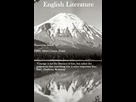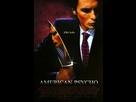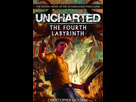- Mise en forme JVCode
- Afficher les avatars
- Afficher les signatures
- Afficher les spoilers
- Miniatures Noelshack
- Accueil
- Actus
- Tests
- Vidéos
- Images
- Soluces
- Forum
Sujet : Dossier Anglais
The Road Not Taken
Two roads diverged in a yellow wood,
And sorry I could not travel both
And be one traveler, long I stood
And looked down one as far as I could
To where it bent in the undergrowth;
Then took the other, as just as fair
And having perhaps the better claim,
Because it was grassy and wanted wear;
Though as for that the passing there
Had worn them really about the same,
And both that morning equally lay
In leaves no step had trodden black.
Oh, I kept the first for another day!
Yet knowing how way leads on to way,
I doubted if I should ever come back.
I shall be telling this with a sigh
Somewhere ages and ages hence:
Two roads diverged in a wood, and I —
I took the one less traveled by,
And that has made all the difference.
(Robert Frost)
Lord of the Flies
Finally the laughter died away and the naming continued. There was
Maurice, next in size among the choir boys to Jack, but broad and grinning
all the time. There was a slight, furtive boy whom no one knew, who
kept to himself with an inner intensity of avoidance and secrecy. He muttered
that his name was Roger and was silent again. Bill, Robert, Harold,
Henry; the choir boy who had fainted sat up against a palm trunk, smiled
pallidly at Ralph and said that his name was Simon.
Jack spoke.
“We’ve got to decide about being rescued.”
There was a buzz. One of the small boys, Henry, said that he wanted
to go home.
“Shut up,” said Ralph absently. He lifted the conch. “Seems to me we
ought to have a chief to decide things.”
“A chief! A chief!”
“I ought to be chief,” said Jack with simple arrogance, “because I’m
chapter chorister and head boy. I can sing C sharp.”
Another buzz.
“Well then,” said Jack, “I—”
He hesitated. The dark boy, Roger, stirred at last and spoke up.
“Let’s have a vote.”
“Yes!”
“Vote for chief!”
“Let’s vote—”
This toy of voting was almost as pleasing as the conch. Jack started to
protest but the clamor changed from the general wish for a chief to an
election by acclaim of Ralph himself. None of the boys could have found
good reason for this; what intelligence had been shown was traceable to
Piggy while the most obvious leader was Jack. But there was a stillness
about Ralph as he sat that marked him out: there was his size, and attractive
appearance; and most obscurely, yet most powerfully, there was
the conch. The being that had blown that, had sat waiting for them on
the platform with the delicate thing balanced on his knees, was set apart.
“Him with the shell.”
“Ralph! Ralph!”
“Let him be chief with the trumpet-thing.”
Ralph raised a hand for silence.
“All right. Who wants Jack for chief?”
With dreary obedience the choir raised their hands.
“Who wants me?”
Every hand outside the choir except Piggy’s was raised immediately.
Then Piggy, too, raised his hand grudgingly into the air.
Ralph counted.
“I’m chief then.”
William Golding (1954)
O Me! O Life!
Oh me! Oh life! of the questions of these recurring,
Of the endless trains of the faithless, of cities fill’d with the foolish,
Of myself forever reproaching myself, (for who more foolish than I, and who more faithless?)
Of eyes that vainly crave the light, of the objects mean, of the struggle ever renew’d,
Of the poor results of all, of the plodding and sordid crowds I see around me,
Of the empty and useless years of the rest, with the rest me intertwined,
The question, O me! so sad, recurring—What good amid these, O me, O life?
Answer.
That you are here—that life exists and identity,
That the powerful play goes on, and you may contribute a verse.
(Walt Whitman)
1892





Table of Contents
Thematic: Travels & Initiatory Journeys - The Adventure
- "O Me! O Life!", Walt Whitman. (1892)
- The Road not Taken, Robert Frost. (1920)
- Personal Document: -The cover from the book: Uncharted: The Fourth Labyrinth (2011)
- A picture from the video game Uncharted 3: Drake's Deception. (2011)
Table of Contents
Thematic: Characters & Their Representations - the Anti-hero
- Lord of the Flies (Chapter 1), William Golding. (1954)
- The Great Gatsby (Chapter 3), F. Scott Fitzgerald. (1925)
- Personal Document: The Cover from the film: Amercian Psycho (2000)
English
I am going to talk about the thematic of the Characters And Their Representations, more precisely through the theme of the anti-hero.
In literature, a character is person who draws the attention by the aspects of his/her personality. He/She cans be a real person or fictional.
An anti-hero is a character who doesn't possess traditionnal specifications in his personality or in his physical qualities.
To talk about of this thematic, I have chosen the first chapter of Lord of the Flies by William Golding and the third chapter of The Great Gatsby by Scott Fitzgerald.
Firstly, Lord of the Flies written by William Golding in 1954, the story speaks about a British plane which crashes on an isolated island in the Pacific Ocean. The only survivors are teenagers.
It is an island book like Robinson Crusoe by Daniel Defoe.
I have chosen the first chapter because in this passage we can see a confrontation between the hero named Ralph and the anti-hero called Jack.
The extract is a real confrontation because there is a vote to elect the chief of the teenagers. Jack the anti-hero is described as an arrogant boy as we can see line 15: "Jack with simple arrogance", then line 24-25, he seems to disagree for a vote: "Jack started to protest".
Moreover, through the book he expresses an unquenchable desire to hunt and kill pigs and he spends hours in solitude, traversing the island.
He begins to paint his face with clay and earth, masking his humanity from the pigs and inspiring terrible fear among the boys.
The aspects of the anti-hero in this book are represented by the physical changes of Jack.
Now, I'm going to talk about another anti-hero, Jay Gatsby in The Great Gatsby written by Scott Fitzgerald in 1925.
The expression of the anti-hero are revealed by his dubious activities.
The story speaks about Nick Carraway a bond salesman who moves close to a big mansion which belongs to a rich man called Jay Gatsby. They are always huge parties with Jazz and alcohol. The plot is set during the 20's in New York City, so in the USA during this period there is the prohibition and that's the Jazz Age.
However, to come back to theme of the anti-hero and the way it is represented, we have to look the end of the passage. Then, we can see that Jay Gatsby is a mysterious man, they are speculations about him.
There is a woman who says that he is a killer: "Somebody told me they thought he killed a man once" and another woman says that he was a German spy: "it's more that he was a German spy during the war". And the passage ends with: I'll bet he killed a man". So, as we can read, nobody knows who is Gatsby and the informations about him are negatives. Some people say that he is probably a killer.
Plus, later in the book we learn that he is bootlegger and it was forbidden during the 20's on account of the Probition Law.
Finally, in this book, Gatsby's actions who make him a perfect anti-hero, his fortune is based on the bootlegging.
Now, I am going to show you my personal document. So, it is the cover from the film American Psycho, it is the adaptation of the book with the same name by Bret Easton Ellis. American Psycho is the story of Patrick Bateman, a rich, arrogant, twenty-something yuppie in 1980’s New York, who also happens to be an insane serial killer.
He is the perfect anti-heroe, he kills without any remorse or compassion. Plus, Patrick Bateman is vain and materialistic. Through the book he manages to maim, torture, and kill dozens of people.
To conclude, we have seen different types of representation of anti-heroes, in Lord of the Flies with Jack and his physical changes. In The Great Gatsby with his fortune which is based on the bootlegging. And in American Psycho with his murders.
All of them have done awful actions thay why they are anti-heroes but they have something interesting in their personality, that's why we like them in a certain way.
English
I am going to talk about the thematic of Travels & Initiatory Journeys more precisely through the theme of The Adventure.
Here, we talk about metaphorical travels in literature.
The Adventure implies difficulties that the main character has to overcome.
To illustrate this thematic, I have chosen to present to you two poems: the first is entitled
"O Me! O Life!" and second one is called The Road Not Taken.
Firstly, in the poem "O Me! O Life!" written by Walt Whitman in 1892, the speaker questions his own existence and the futility of life. It is a poem of contrasts and, ultimately, a statement about the humble but irrepressible value of life.
Otherwise, the essential idea is that no matter how miserable the world seems "cities filled with the foolish" and no matter how disappointed we can be with ourself "of myself forever reproaching myself", life is still worth living.
The question of the poem is "what is the point of living if everything seems so terrible around us ?".
The answer consists in an advise to the speaker himself or as the author was speaking to us and advising us: "That you are here -that life...".
Those two verses mean that even in the darkest hour of our life, life still exists, there is hope and the struggle is a part of life.
We have inherent the power and potential to contribute to the change of history and life: "You may contribute a verse".
This poem can be regarded as a reflection on life by Walt Whitman, he wrote this poem the year of his death and maybe he shares his experience on life and says to us that life worth it and we have to play it in the better way, that is a part of the adventure.
Now, I'm going to present The Road Not Taken written by Robert Frost.
In this poem, there is a traveler who has to choose between diverging paths in a wood, and he sees that choice as a metaphor for choosing between different directions in life.
He regrets that he cannot follow both roads, he pauses for a long time to consider his choice.
In the first stanza, one road seems preferable. However, by the beginning of the third stanza he has decided that the paths are roughly equivalent.
Later in the third stanza, he tries to cheer himself up by reassuring himself that he will return someday and walk the other road. But, he realizes the impact of his decision in his life.
He realizes that he probably will never return to walk the alternate road.
But, the poem ends with a positive note: "I took the one less traveled by,/And that has made all the difference".
The main idea of the poem is that in life we have to make important decisions so important that they change the direction of our life and it is a part of the adventure.
Now, I'm going to show you my personal document. So, it is the cover of the book Uncharted: The Fourth Labyrinth. It is the adaptation from the videogame Uncharted 3: Drake's Deception.
I have chosen this document because in my opinion, the main character, called Nathan Drake represents the ideas of travels and adventure.
In the video game he travels a lot, for example in move to an old castle in France, then in a museum in London and in the desert of Rub' al Khali in Yemen to find evidences of his ancestor Sir Francis Drake, a real person.
Gestion du forum
Sujets à ne pas manquer
- Aucun sujet à ne pas manquer